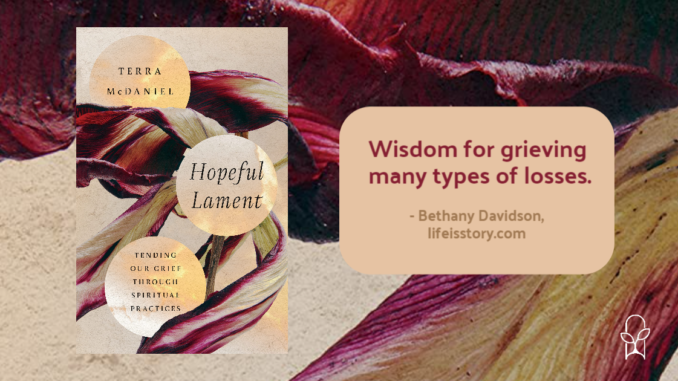
Published by IVP on October 10, 2023
Genres: Non-Fiction, Christian Life
Buy on Amazon
Goodreads

We need to rediscover lament to heal and hope again.
We've lost the practice of lament. Most people don't know how to process personal or communal mourning and instead struggle to honor their tears, vulnerability, and the full weight of these disillusioning times. But tending our grief might be exactly what we need to reimagine a way forward.
Tracing her difficult experiences of a catastrophic home fire, a threat to her child's well-being, and other devastating losses and upheavals, Terra McDaniel offers a clear framework for expressing heartache and burdens. McDaniel says, "Lament is surprisingly hopeful. As strange as that may sound now, I promise it’s true. It's an act of trust both that we can face pain and survive, and that God cares about our anger, confusion, doubt, grief, and fear. Lament refuses to bury pain or, just as dangerous, to give in to despair."
Hopeful Lament makes space for the powerful act of crying out before a loving God and offers provoking reflection questions, embodied practices, and applications for families with children. Learn how to journey gently through suffering.
Terra McDaniel writes about how essential lament is in the Christian life, helping her readers understand how they can truly grieve their losses without papering over their pain through platitudes or spiritual bypassing. She writes some about how her theology has shifted and changed over time towards a better understanding of how God is truly with us in our pain, rather than always trying to teach us a lesson or punishing us in some way, and she shows how lament can help Christians lean on and trust God through heartbreaking circumstances.
McDaniel shares about some of her own experiences, such as losing her family home to a fire, leaving a toxic and traumatic church situation, and mourning the death of her grandchild when her daughter suffered a traumatic pregnancy loss. She weaves in Scripture and Bible stories throughout Hopeful Lament, and she provides readers with helpful insights about how grief affects our minds, bodies, and souls. Each chapter ends with a suggested practice for processing grief, such as talking to God with breath prayers, tearing fabric or paper, and journaling laments. She suggests modifications for doing these activities with children as well, and one of the final chapters is about helping children grieve.
Hopeful Lament: Tending Our Grief Through Spiritual Practices is a powerful resource for suffering Christians. I found some of the author’s political and social commentary oversimplified and distracting, and I wish that she had unpacked these ideas in a more nuanced way, but I still greatly appreciated this book’s wisdom about grieving many different types of losses. This will be helpful for people to read individually or with family and friends, and it can be very valuable in counseling and therapeutic contexts.
